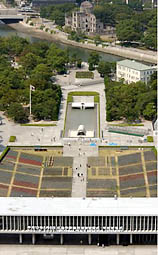 Hiroshima is getting ready for the "A-bomb Day" tomorrow, the first A-bomb Day in the 21st century. The A-bomb victims (hibakusha) are the victims of the first nuclear weapon used in history. Etched in their minds are experiences they can never fully express in words, and memories they can never forget however they might try. Their pleas have acted as a deterrent to nuclear war. It is imperative that the experiences of the aging hibakusha are handed down to future generations. (Kazuo Yabui)
Hiroshima is getting ready for the "A-bomb Day" tomorrow, the first A-bomb Day in the 21st century. The A-bomb victims (hibakusha) are the victims of the first nuclear weapon used in history. Etched in their minds are experiences they can never fully express in words, and memories they can never forget however they might try. Their pleas have acted as a deterrent to nuclear war. It is imperative that the experiences of the aging hibakusha are handed down to future generations. (Kazuo Yabui)
Hiroshima City Education Board published a "Study on Children's Awareness
of Peace" in June. The findings shocked the hibakusha and educators.
Even in this city where the A-bomb was dropped, over half of elementary
school pupils and almost 30% of middle school students could not pinpoint
the exact year of the atomic bombing. At a time when the experience of
the hibakusha is becoming "history," the study underscored the
urgency of the task of handing down that experience.
In July, Hiroshima City compiled a list of 19 tasks as part of a program
to promote passing on such experience to the younger generation. The tasks
include research and collection of documents on the A-bomb experience and
reinforcement of peace studies. We hope for steady progress toward fruition
through cooperation with the hibakusha and the citizens.
The number of surviving hibakusha in Hiroshima City (as of March 31) fell
under 90,000 to 88,592. The average age rose 0.7 year to 70.1, exceeding
70 for the first time.
Hibakusha living overseas, estimated to number approximately 5,000, should
not be forgotten. In June, the Osaka District Court ruled in favor of applying
the A-bomb Victims Relief Law to hibakusha living overseas. The Japanese
government appealed, but the Ministry of Health, Labor and Welfare has
begun to review the law. The government must take seriously the Osaka District
Court's view that the current situation "could be unconstitutional."
Over 20,000 nuclear weapons still exist on the earth. At the Nuclear Nonproliferation
Treaty (NPT) Review Conference last May, the nuclear states promised an
"unequivocal undertaking" to abolish nuclear weapons.
More than a year has passed since then. The United States, under the Bush
administration, has proposed early deployment of missile defense, prompting
concerns of a nuclear arms race. Hiroshima must play a large role in heightening
the international opinion to urge the nuclear states to carry out their
"unequivocal undertaking."
Mayor Akiba Tadatoshi of Hiroshima City advocated in a peace declaration
that this century be "the century of peace and humanity." The
mayor states that "Hiroshima hopes to soar as a city of humanity."
Whether that spirit will take root depends on how we address this issue
in the future.
(Caption) Peace Memorial Park, where the Peace Memorial Ceremony will take place for the first time in the 21st century. The A-Bomb Dome and the Peace Memorial Museum continue to send the message of "No more Hiroshima" to the world.